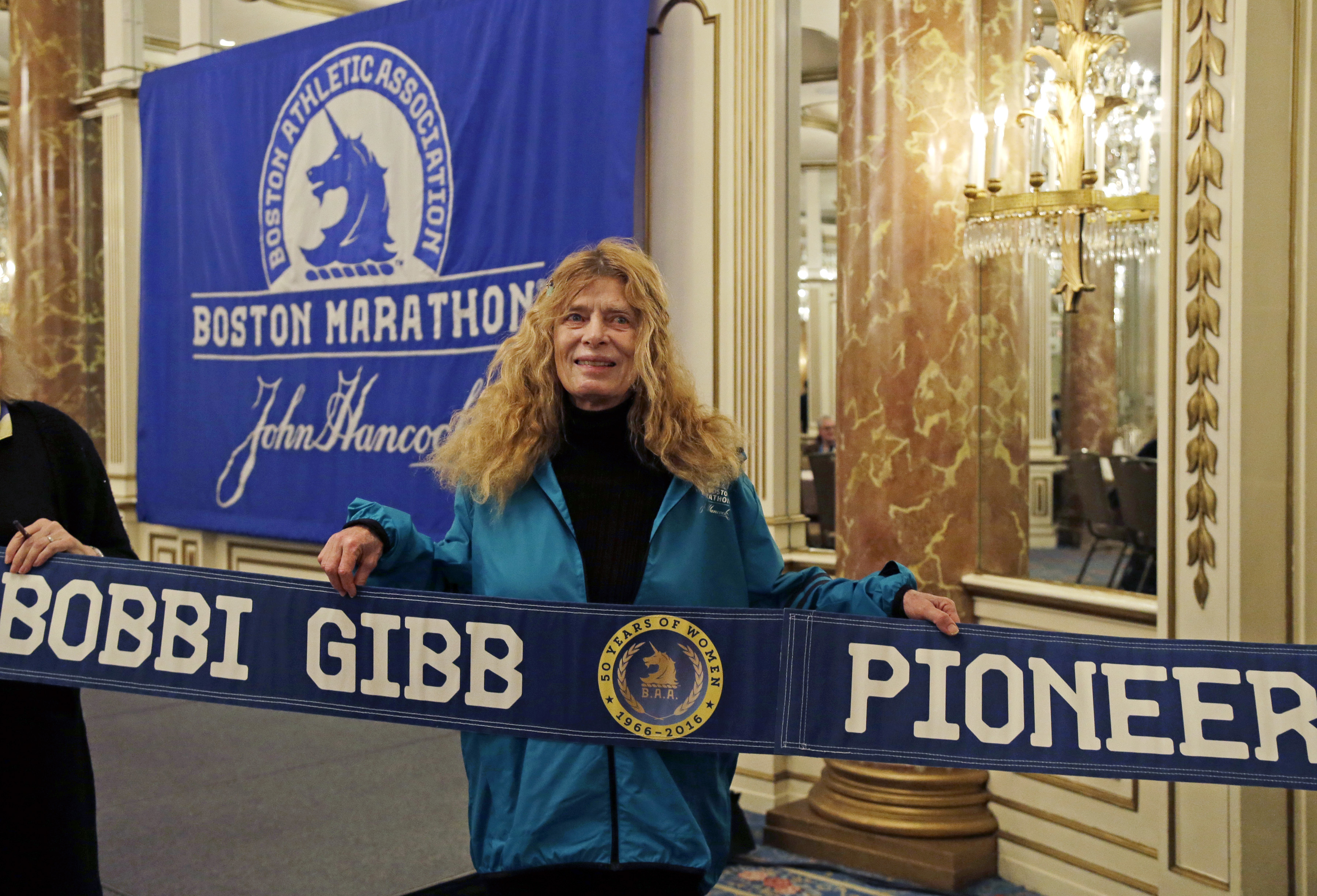BOSTON — For Roberta “Bobbi” Gibb, being allowed to finish the Boston Marathon was of much greater concern than being physically capable of running 26.2 miles.
Gibb handled the distance just fine and reshaped the future of one of America’s most celebrated athletic events, still a men’s only competition when Gibb boldly pushed her way into the field in 1966.
“I had a little window of opportunity there and I ran through it,” said Gibb, the first woman to run the Boston Marathon.
Gibb’s determination has been widely recognized in advance of Monday’s race, which will include more than 13,000 women competing in an event Gibb had to sneak into 50 years before.
Gibb said her attempt to run in 1966 made it only as far as an application request she mailed. The response, she said, was a terse “No” because women weren’t part of the event.
“I got a letter saying women are not physiologically able to run marathons and we can’t take the medical liability,” Gibb said.
![Going for Gold: Linden looks forward to chance at redemption [oembed : 83167134] [oembed : 83167134] [oembed : 83167134] [oembed : 83167134]](/Portals/_default/Skins/PrestoLegacy/CommonCss/images/smartembed.png)
Undeterred, Gibb hid in the bushes near the starting line and waited for the right moment to join the pack of more than 500 men who were setting out from Hopkinton.
“I kind of ran around looking for a place to hide because I was afraid I would be arrested,” she said. “And I knew if the officials saw me they’d would throw me out.”
Gibb even wore a hooded sweatshirt to help hide the fact that a woman was defying the rules. The hood came off and Gibb was quickly noticed, becoming an instant celebrity that day and a pioneer for the women who would follow.
“It’s so cool. It’s been really fascinating to hear about Bobbi’s story,” said Neely Spence Gracey, a 26-year-old who is the top hope for U.S. runners in the women’s field. “I’m very grateful.”
Even after Gibb’s historic run, it took years before a women’s division was included in the race. Gibb ran again in 1967 and ‘68, winning the unofficial women’s title both times, and planned to enjoy the celebration of her 50-year anniversary by watching Monday with the knowledge she had indeed changed the way women were perceived.
“This is such a special time,” Gibb said. “I’m meeting so many wonderful people — meeting people, seeing old friends. It’s just like a big family reunion.”
Monday is the 120th running of the Boston Marathon and features the defending champions in both the men’s and women’s fields.
Lelisa Desisa of Ethiopia is going for his third men’s title in four years, running away with the 2015 race and replacing the cherished medal from his first win in 2013. He gave back the 2013 medal in honor of victims killed and wounded by homemade bombs that went off near the finish line that year.
Race organizers held a moment of silence at the finish on Friday, marking the somber anniversary.
Caroline Rotich of Kenya is also back to defend the women’s title she won last year with a late push over the final 30 yards, outstriding Mare Dibaba of Ethiopia by four seconds.
Many runners expressed their gratitude personally to Gibb last week. Uninvited 50 years ago, she’s an honored guest this year. There is also an effort for a more permanent reminder of Gibb’s accomplishment that stood out in a decade full of social change.
Joan Benoit Samuelson is one of several Boston champions lobbying for a statue of Gibb to be placed on the course.
“She was the first one to run from Hopkinton to Boston,” said Samuelson, still Joan Benoit when she won her first Boston title in 1979. “The fact that she’s still very passionate and visible in the sport is something to celebrate for all the ages.”
Organizers behind the Bobbi Gibb Sculpture Project already have the artist picked out — one quite familiar with the story. It’s Gibb, an attorney who has taken on research to find cures for neuro-degenerative diseases, and an accomplished artist.
“I didn’t really know Bobbi’s story until 1979 when I came to run my first Boston Marathon,” Samuelson said. “It wasn’t in the textbooks back then, but it is now.”
Perhaps it will be represented in bronze, too, somewhere along the storied route from the western suburbs into Boston.


![2016-4-17-bobbi-gibb [image : 83167064]](http://www.gannett-cdn.com/media/2016/04/17/USATODAY/USATODAY/635965157994218371-AP-BOSTON-MARATHON-50-YEARS-OF-WOMEN-81273721.JPG)
